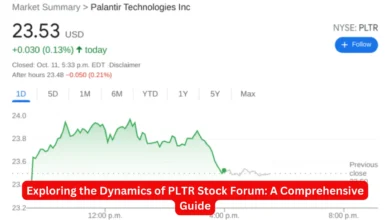The Impact of Fintech Innovations on the Dow Jones Industrial Average

In the contemporary landscape of financial markets, fintech innovations are dramatically reshaping investment strategies and stock market dynamics. The Dow Jones Industrial Average (DJIA), as a barometer of American economic health, is increasingly influenced by these technological advancements. This article delves into how fintech innovations are affecting the Dow Jones and offers insights into investment strategies that harness these changes effectively.
Understanding Fintech and Its Influence on the Stock Market
Fintech, short for financial technology, encompasses a range of technologies aimed at enhancing and automating financial services. This sector has introduced groundbreaking tools such as robo-advisors, blockchain technology, and artificial intelligence (AI), which are transforming the way investors interact with the stock market.
The Dow Jones Industrial Average, composed of 30 major publicly traded companies, serves as a crucial indicator of the U.S. economy’s performance. Innovations in fintech have introduced new variables affecting these companies and, by extension, the DJIA.
The Role of Robo-Advisors in Shaping Market Trends
Robo-advisors are automated platforms that use algorithms to manage and allocate investments. These tools offer several advantages, including lower fees and increased accessibility to financial services. As more investors turn to robo-advisors for managing their portfolios, we see a significant shift in how investment decisions are made.
- Increased Market Participation: Robo-advisors have democratized access to investment opportunities, allowing a broader demographic to participate in the stock market. This increased participation can lead to higher trading volumes and potentially more volatility in the DJIA.
- Data-Driven Insights: By leveraging sophisticated algorithms, robo-advisors provide data-driven investment insights that can influence stock prices. As these platforms grow in popularity, their investment recommendations can sway market trends and impact the performance of Dow Jones constituents.
Blockchain Technology and Its Implications for Financial Markets
Blockchain technology, the backbone of cryptocurrencies like Bitcoin, is also making waves in traditional financial markets. This decentralized ledger system ensures transparency and security in transactions, which is crucial for maintaining market integrity.
- Enhanced Security: Blockchain’s ability to securely record transactions can reduce instances of fraud and market manipulation, thereby fostering a more stable market environment.
- Smart Contracts: These self-executing contracts with terms written into code can automate and streamline various financial processes, from trading to settlement. The adoption of smart contracts in financial services could lead to increased efficiency and potentially impact the DJIA by altering trading patterns.
Artificial Intelligence: Revolutionizing Investment Strategies
Artificial Intelligence (AI) has emerged as a transformative force in financial markets. AI systems analyze vast amounts of data to uncover patterns and predict market movements with remarkable accuracy.
- Algorithmic Trading: AI-driven algorithmic trading has become prevalent, allowing for high-frequency trading and more sophisticated market analysis. This can lead to significant shifts in stock prices and influence the DJIA.
- Predictive Analytics: AI’s predictive capabilities enable investors to anticipate market trends and adjust their strategies accordingly. This can result in more informed investment decisions and potentially impact the performance of Dow Jones companies.
Investment Strategies in the Age of Fintech
Navigating the evolving landscape shaped by fintech innovations requires adapting investment strategies to leverage new technologies effectively. Here are key strategies to consider:
- Diversification with Fintech Tools: Utilize fintech platforms to diversify your portfolio across various asset classes and sectors. This can help mitigate risks associated with individual stocks and enhance overall returns.
- Data-Driven Decisions: Leverage AI-powered analytics and robo-advisors to make informed investment decisions based on comprehensive data analysis.
- Blockchain Investments: Explore opportunities in blockchain technology and cryptocurrencies, as they offer potential for high returns and can complement traditional investments.
Conclusion
The influence of fintech innovations on the Dow Jones Industrial Average is profound and multifaceted. From the rise of robo-advisors and blockchain technology to the integration of AI in trading strategies, these advancements are reshaping investment practices and market dynamics. By embracing these technologies and adapting investment strategies accordingly, investors can navigate the evolving landscape and capitalize on new opportunities.




